2024年广东省深圳市中考英语一对一补课资料(无答案)
文档属性
| 名称 | 2024年广东省深圳市中考英语一对一补课资料(无答案) | 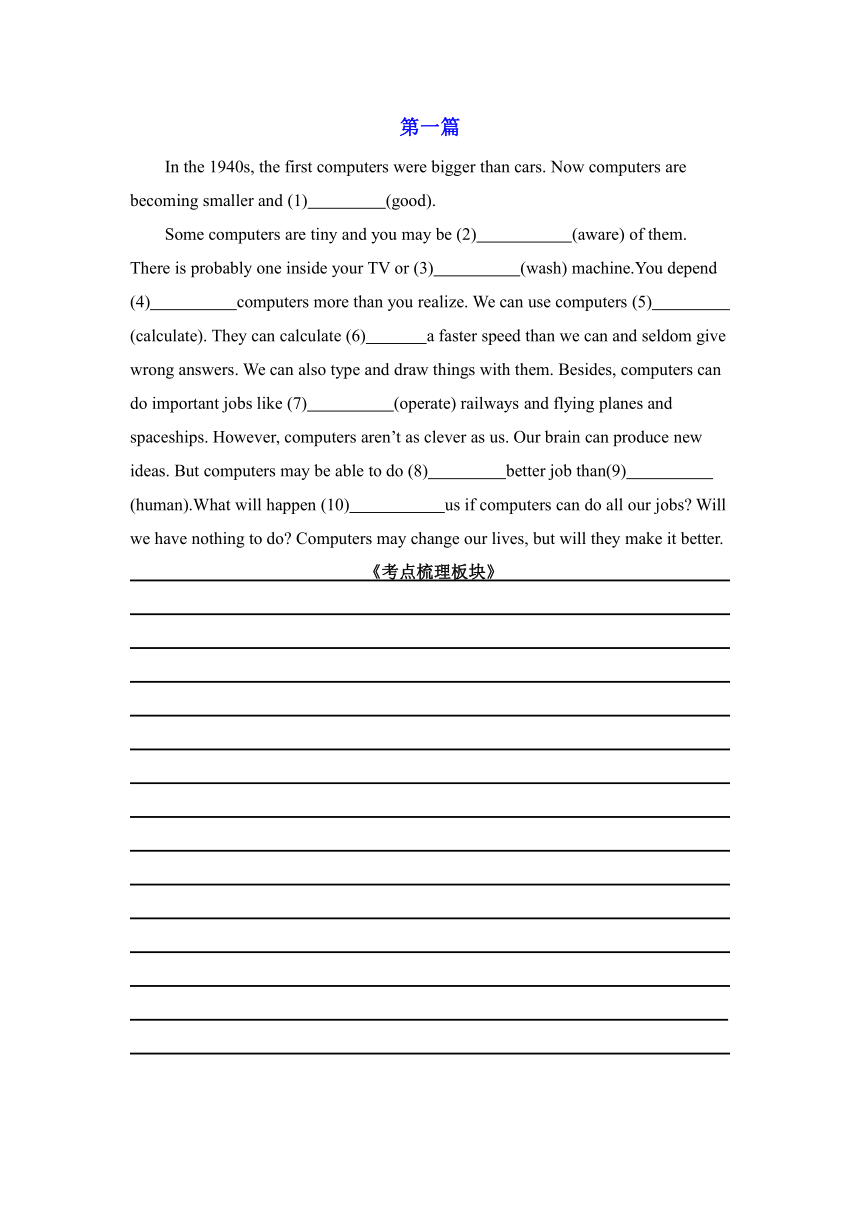 | |
| 格式 | docx | ||
| 文件大小 | 122.6KB | ||
| 资源类型 | 教案 | ||
| 版本资源 | 通用版 | ||
| 科目 | 英语 | ||
| 更新时间 | 2024-04-30 21:12:01 | ||
图片预览

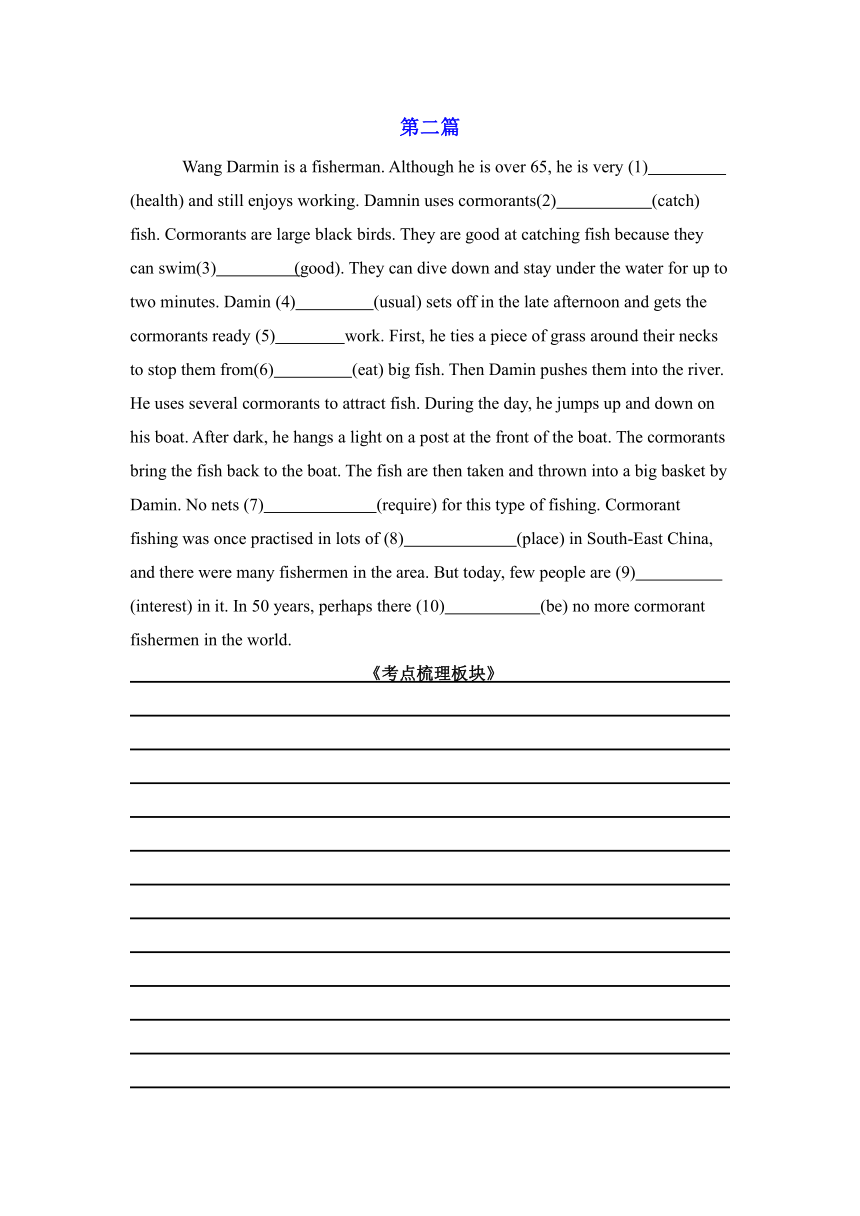
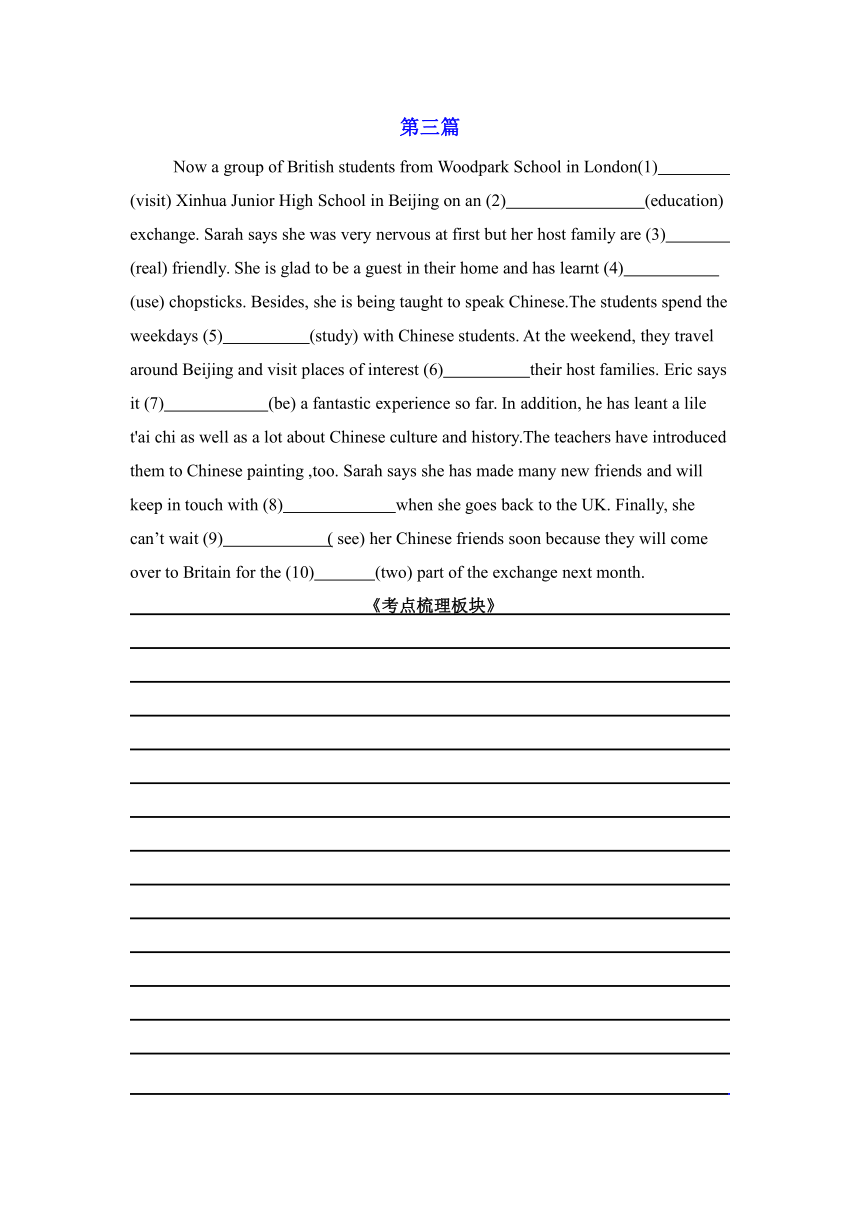
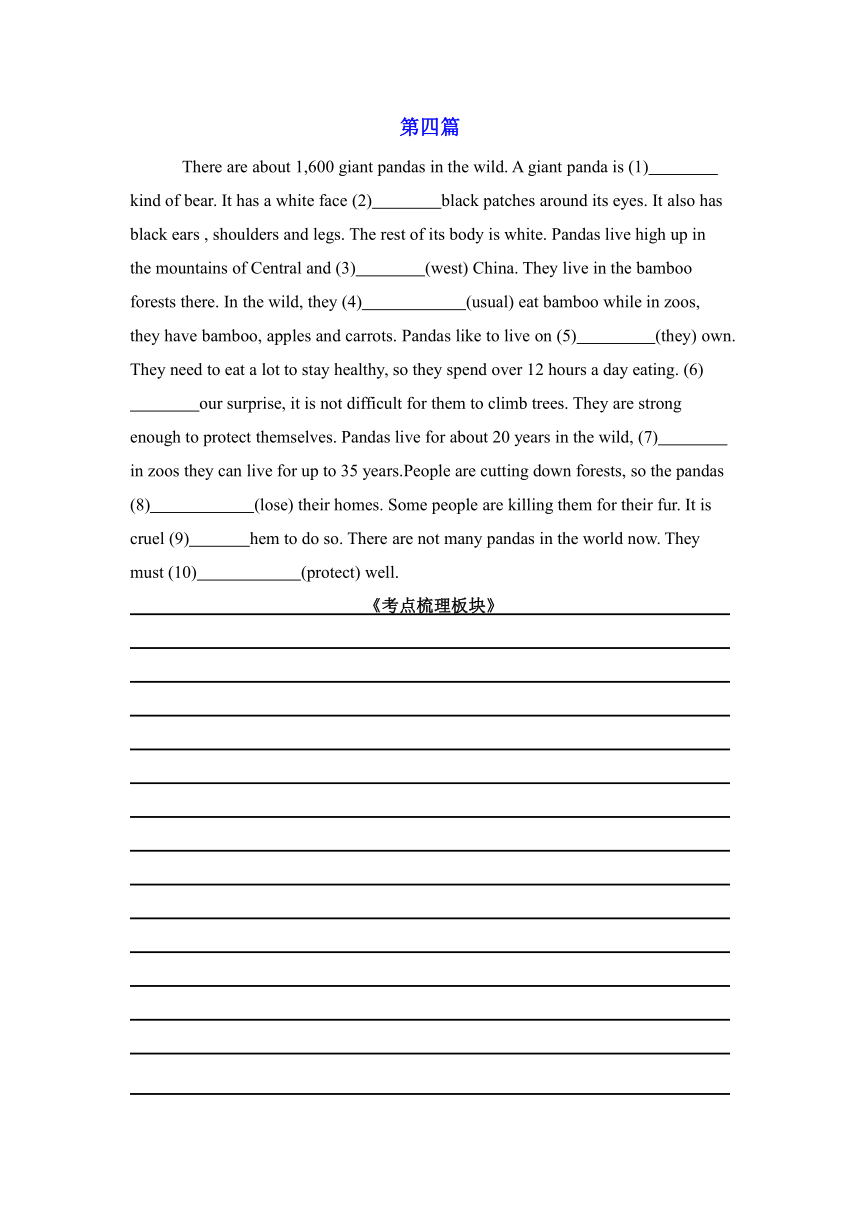
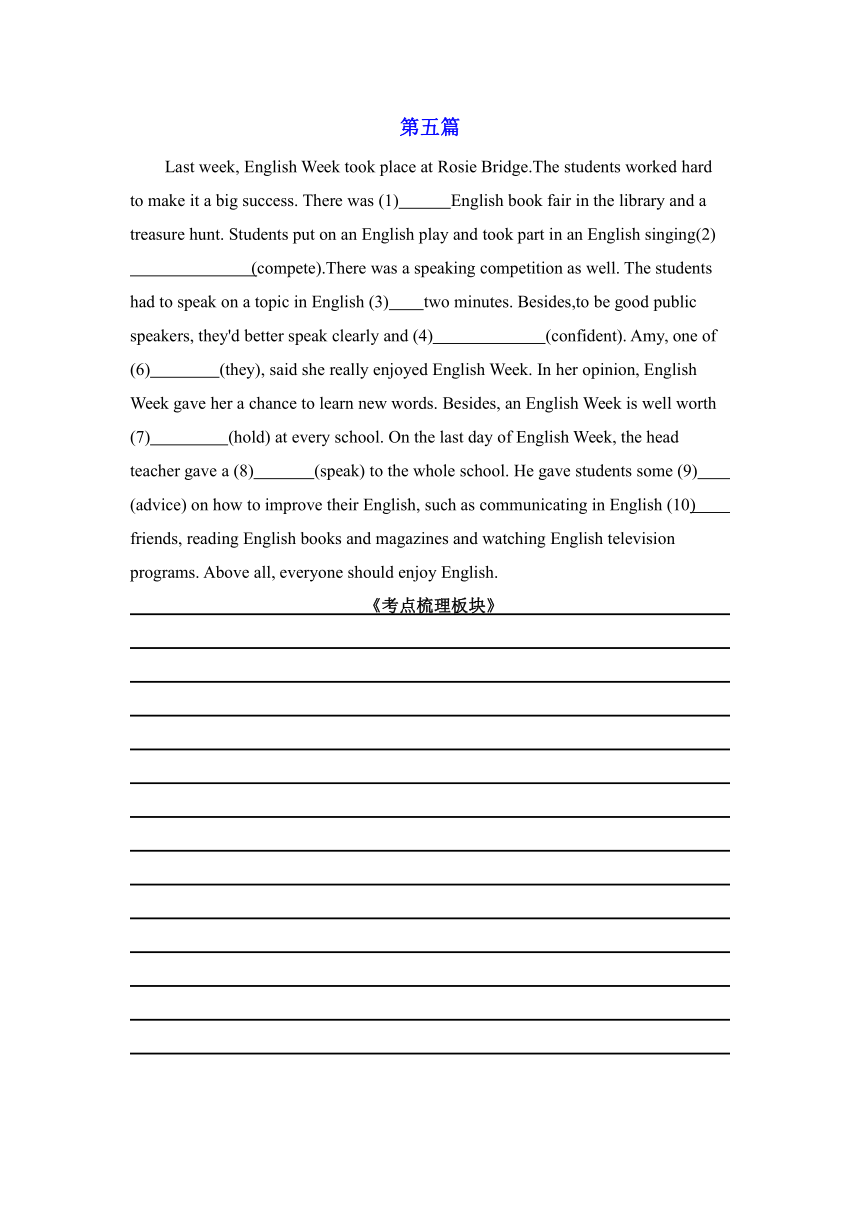
文档简介
第一篇
In the 1940s, the first computers were bigger than cars. Now computers are becoming smaller and (1) (good).
Some computers are tiny and you may be (2) (aware) of them. There is probably one inside your TV or (3) (wash) machine.You depend (4) computers more than you realize. We can use computers (5) (calculate). They can calculate (6) a faster speed than we can and seldom give wrong answers. We can also type and draw things with them. Besides, computers can do important jobs like (7) (operate) railways and flying planes and spaceships. However, computers aren’t as clever as us. Our brain can produce new ideas. But computers may be able to do (8) better job than(9) (human).What will happen (10) us if computers can do all our jobs Will we have nothing to do Computers may change our lives, but will they make it better.
《考点梳理板块》
第二篇
Wang Darmin is a fisherman. Although he is over 65, he is very (1) (health) and still enjoys working. Damnin uses cormorants(2) (catch) fish. Cormorants are large black birds. They are good at catching fish because they can swim(3) (good). They can dive down and stay under the water for up to two minutes. Damin (4) (usual) sets off in the late afternoon and gets the cormorants ready (5) work. First, he ties a piece of grass around their necks to stop them from(6) (eat) big fish. Then Damin pushes them into the river. He uses several cormorants to attract fish. During the day, he jumps up and down on his boat. After dark, he hangs a light on a post at the front of the boat. The cormorants bring the fish back to the boat. The fish are then taken and thrown into a big basket by Damin. No nets (7) (require) for this type of fishing. Cormorant fishing was once practised in lots of (8) (place) in South-East China, and there were many fishermen in the area. But today, few people are (9) (interest) in it. In 50 years, perhaps there (10) (be) no more cormorant fishermen in the world.
《考点梳理板块》
第三篇
Now a group of British students from Woodpark School in London(1) (visit) Xinhua Junior High School in Beijing on an (2) (education) exchange. Sarah says she was very nervous at first but her host family are (3) (real) friendly. She is glad to be a guest in their home and has learnt (4) (use) chopsticks. Besides, she is being taught to speak Chinese.The students spend the weekdays (5) (study) with Chinese students. At the weekend, they travel around Beijing and visit places of interest (6) their host families. Eric says it (7) (be) a fantastic experience so far. In addition, he has leant a lile t'ai chi as well as a lot about Chinese culture and history.The teachers have introduced them to Chinese painting ,too. Sarah says she has made many new friends and will keep in touch with (8) when she goes back to the UK. Finally, she can’t wait (9) ( see) her Chinese friends soon because they will come over to Britain for the (10) (two) part of the exchange next month.
《考点梳理板块》
第四篇
There are about 1,600 giant pandas in the wild. A giant panda is (1) kind of bear. It has a white face (2) black patches around its eyes. It also has black ears , shoulders and legs. The rest of its body is white. Pandas live high up in the mountains of Central and (3) (west) China. They live in the bamboo forests there. In the wild, they (4) (usual) eat bamboo while in zoos, they have bamboo, apples and carrots. Pandas like to live on (5) (they) own. They need to eat a lot to stay healthy, so they spend over 12 hours a day eating. (6)
our surprise, it is not difficult for them to climb trees. They are strong enough to protect themselves. Pandas live for about 20 years in the wild, (7) in zoos they can live for up to 35 years.People are cutting down forests, so the pandas (8) (lose) their homes. Some people are killing them for their fur. It is cruel (9) hem to do so. There are not many pandas in the world now. They must (10) (protect) well.
《考点梳理板块》
第五篇
Last week, English Week took place at Rosie Bridge.The students worked hard to make it a big success. There was (1) English book fair in the library and a treasure hunt. Students put on an English play and took part in an English singing(2)
(compete).There was a speaking competition as well. The students had to speak on a topic in English (3) two minutes. Besides,to be good public speakers, they'd better speak clearly and (4) (confident). Amy, one of (6) (they), said she really enjoyed English Week. In her opinion, English Week gave her a chance to learn new words. Besides, an English Week is well worth (7) (hold) at every school. On the last day of English Week, the head teacher gave a (8) (speak) to the whole school. He gave students some (9) (advice) on how to improve their English, such as communicating in English (10) friends, reading English books and magazines and watching English television programs. Above all, everyone should enjoy English.
《考点梳理板块》
第六篇
It is August 2050. At the moment, some people(1) (write) about hotels, houses and cars on the Internet. The following are their (2) (post). The Hotel Whale is built under the water. It is in the shape of a whale. This hotel has 50 bedrooms, a cafe and a shopping centre.(3) (visit ) can watch the fish outside their bedroom window. They never get (4) (bore). Forever Green Houses are both “green”and“smart”. There is glass outside the houses. Heat is held under the glass and is then used as energy for each house. In the bathroom, your medicine cupboard (5) (connect) to your doctor’s computer. In the kitchen, your smart fridge tells the supermarket’s computer when you need more food. Everyone will be satisfied (6) Forever Green Houses. The CJ3 is a new type of hydrogen car. The hydrogen in the car is mixed with oxygen from the air (7)
(make) electricity for the car. The CI3 has (8) electronic map and is driven by a computer. You tell the computer (9) you want to go. Then you sit back and relax as the car takes you there. The CI3 is (10) (friend) to the environment.
《考点梳理板块》
第七篇
Paula interviewed two teenagers for a programme on family life.The following is something about the interview. Emily is 15 years old.There are three people in her family, her parents and her. She has got a lot of possessions (1) a big TV, a new computer and a mobile phone. Her parents don't expect her (2) (do) the housework. Sometimes her family go out for dinner, but her father is often abroad (3) business, and her mother works too. They usually do their (4) (person) things. Her parents don’t usually set rules for her. Since she is a good daughter, she is never (5) (punish). She likes her new flat and it's much (6) (big) than her last one. However, she feels lonely when her parents are away from home.Jerry is aged 14. He lives with his parents, his grandma and his sister Rosie. (7) the little flat sometimes makes them feel crowded, they don’t mind. He hasn’t got many possessions. He has no interest (8) things like fashionable clothes. His grandma thinks new fashions soon go out of date. He helps with the housework, such as (9) (wash) the dishes and ironing his own shirts. His family like doing things together. At home, his family set rules for him. He loves all his family very much.They have (10) close relationship and they always support each other.
《考点梳理板块》
第八篇
Here is a story happening in ancient Greece. One day, King Hiero asked a crown maker (1) (make) a golden crown for him.At first the king was very happy (2) it. Later, however, he began to doubt that it was a real golden crown.The king sent it to Archimedes and asked him to find out the (3) (true). Archimedes thought that was (4) very difficult problem. When he got into the bath full (5) water, some water ran over. Then he knew (6) to deal with the problem. He put two pots into two big bowls and filled both pots with water. He put the gold into one pot, and some water ran into the bowl.Then he put the crown into the other pot.This time, even (7) (much) water ran into the bowl.Therefore, Archimedes could make sure the crown was not completely (8) (make) of gold. (9) a bad man! He tricked the king and the king got very angry. Finally, the crown maker (10) (send) to prison.
《考点梳理板块》
第九篇
Shanghai is in the east of China. It is one of the (1) (large) cities in the world. If you like sightseeing, you will love .
People's Square is in the centre of Shanghai. It is a large public area (3)
green grass, fountains and birds. If you visit People’s Square, you can also see famous buildings around it (4) the Shanghai Grand Theatre and the Shanghai Museum.The Bund is where old Shanghai meets new Shanghai. If you walk along the Bund, you (5) (see) many old buildings. The Pudong New Area, just(6)
(cross) the Huangpu River, has many modern buildings. At night, these tall buildings light up the sky in every (7) (direction).Yu Garden is (8) traditional garden. If you enjoy history and (9) (nature) beauty, you will love this garden. There are many beautiful buildings, bridges and ponds.You can also (10)
( buy) different snacks just outside the garden.
《考点梳理板块》
第十篇
Do you know France France is in (1) (west) Europe. It is a country with many (2) (beauty) places. Paris is (3) capital of France.You will find many famous (4) (place) of interest here (5) the Eiffel Tower. You can go to the Louvre Museum if you like art. The most famous street in Paris is the Champs-Elysees.This is a wonderful place (6) (go) if you want to visit some shops and department stores. France is very famous (7) its wine. There are many vineyards in the centre of France and farmers grow grapes to make excellent French wine. The south of France lies on the coast.The wonderful beaches here make (8) very famous. A French town by the sea is the perfect place for a summer holiday, but if you prefer to (9) (visit ) France in winter, you can try (10) (ski) on the mountains in the French Alps. France has something for everyone,so what about visiting France this year
《考点梳理板块》
中英互译一
look up: look into: look through:
collector: collection:
be born in:
at the age of:
enable sb to do sth:
make a difference:
in the countryside:
因为...而著名: 作为...而著名:
作笔记:
draw up:
人类【词组】:
die out: die away:
die from: die of:
我有一些重要的事告诉你:
can't help doing sth:
neither of:
either....or....
come up with:
each other:
much too:
中英互译二
go for a walk:
used to do:
once upon a time:
challenge sb to sth.
promise to do sth :
遵守诺言:
priceless:
feel like doing sth:
the amount of
and so forth:
realization: ; v.
结账离开:
13. 遵医嘱:
14. the rest of:
15. be full of:
16. 表程度+比较级:
17. 表程度+原级:
18. fall in love with:
19. 练习做某事:
20. 饥饿n: ; 饥饿的adj:
中英互译三
事实上: =
in 1990: ; in the 1990s:
Be unaware of:
sth happen to sb :
计算器n: 计算v: 计算n:
打字员: ;打字v: ;打字机n:
depend: ;依赖的adj: ; 依赖于(词语):
给某人做一个手术:
at the speed of:
sb be used doing sth: sth be used to do sth:
显示器 鼠标: 复数 主机:
compare...with....: compare...to …:
受某人欢迎:
inexpensive: ; priceless:
作演讲:
害怕做某事:
look forward to doing sth:
work as:
总共,总计:
sell out:
中英互译四
发明家n: ; 发明v: ;发明物n:
passenger:
carriage: ; wheelchair:
uncomfortable:
练习做某事: ; 实用的:
从那以后: =
与某人保持联系:
imagine doing sth:
introduce: ; instruct:
keep off :
乱七八糟: =
距离n: ; 遥远的adj:
on one's own:
在白天: =
代替,而不是:
lead to: ; lead...to....:
与此同时: =
with the development of:
遍及全世界:
创造家: 创造 有创造性的 生物
中英互译五
成功n: ; v. ; adj.
2. 寻宝游戏:
3. 比赛n: ; v. ; adj.
4. 建议(不可数n): ;建议某人去做某事:
5. 建议(可数n): ; 建议做某事:
6. 有机会做某事:
7. as far as I am concerned:
8. be poor at:
9. heart attack:
10. 捉迷藏:
11. 除了做....别无选择:
12. look into: ;look out: ;look through:
13. 注意某人正在做某事:
14. in public:
15. 自信n: ;自信的adj:
16. hide的过去式: ;过去分词:
17. ought to :
18. Must I ...... 的否定回答:
19. 最好不要做某事:
20. 选择做某事:
中英互译六
濒危的:
长度n: 宽度n: 高度n: 重量n: 深度n:
行为方式n:
做...对某人来说是残忍的:
cut down: cut in: cut up:
保护....免受...:
有责任做某事:
组织v. n. 组织者n.
肩并肩: 手拉手:
对某人来说,足够...做某事:
需要被....: /
多个形容词的排序口诀:
太....而不能:
likely : alike
a bit : 一点点 a bit of : 一点点
16. 举例复合adj(至少3个): , ,
17. 形容词做后置定语(举例):
18. up to :
11. 濒危的:
19. 在高处:
20. ...的数量: (+可数名词), (+不可数名词)
中英互译七
make fool /fun of :
electric: ;electrical: ;electricity: ;electronic:
packet: n pack: v package: n
intelligent: (意思) n.
to a certain degree:
have a conversation with sb:
lock up:
与某人保持联系:
had better do sth:
quantity: quality:
quantities of:
in addition:
做实验:
价值n: ; 宝贵的adj:
归还,返回:
干涸:
想象做某事:
freshman:
drop in: ; drop out:
switch off:
中英互译八
can't wait to do sth:
去旅行:
have the ability to do sth:
把...绑在.....:
breathe: ;breath:
遍及全世界:
so....that.....:
拍照:
写日记:
be afraid to do sth:
足够....去做某事:
float away :
换句话说: =
as....as sb can:
in the centre of:
从四面八方: =
过马路: ;穿过森林:
as a result of : as a result:
旅游手册:
在....西北部:
中英互译九
people: ; (可+s)
consider doing sth:
consider to do sth:
幽默n : / ; adj:
personally: personality: ;personal:
attend school:
做演讲:
避免v. ; n. 避免做某事:
在某种程度上: =
in the way: on the way (to):
belief: brief:
让某人失望: =
learn by heart:
失去信心做某事:
can't help doing sth :
后悔做过某事:
碰巧做某事:
feel like doing sth:
intend to do sth:
渴望做某事:
In the 1940s, the first computers were bigger than cars. Now computers are becoming smaller and (1) (good).
Some computers are tiny and you may be (2) (aware) of them. There is probably one inside your TV or (3) (wash) machine.You depend (4) computers more than you realize. We can use computers (5) (calculate). They can calculate (6) a faster speed than we can and seldom give wrong answers. We can also type and draw things with them. Besides, computers can do important jobs like (7) (operate) railways and flying planes and spaceships. However, computers aren’t as clever as us. Our brain can produce new ideas. But computers may be able to do (8) better job than(9) (human).What will happen (10) us if computers can do all our jobs Will we have nothing to do Computers may change our lives, but will they make it better.
《考点梳理板块》
第二篇
Wang Darmin is a fisherman. Although he is over 65, he is very (1) (health) and still enjoys working. Damnin uses cormorants(2) (catch) fish. Cormorants are large black birds. They are good at catching fish because they can swim(3) (good). They can dive down and stay under the water for up to two minutes. Damin (4) (usual) sets off in the late afternoon and gets the cormorants ready (5) work. First, he ties a piece of grass around their necks to stop them from(6) (eat) big fish. Then Damin pushes them into the river. He uses several cormorants to attract fish. During the day, he jumps up and down on his boat. After dark, he hangs a light on a post at the front of the boat. The cormorants bring the fish back to the boat. The fish are then taken and thrown into a big basket by Damin. No nets (7) (require) for this type of fishing. Cormorant fishing was once practised in lots of (8) (place) in South-East China, and there were many fishermen in the area. But today, few people are (9) (interest) in it. In 50 years, perhaps there (10) (be) no more cormorant fishermen in the world.
《考点梳理板块》
第三篇
Now a group of British students from Woodpark School in London(1) (visit) Xinhua Junior High School in Beijing on an (2) (education) exchange. Sarah says she was very nervous at first but her host family are (3) (real) friendly. She is glad to be a guest in their home and has learnt (4) (use) chopsticks. Besides, she is being taught to speak Chinese.The students spend the weekdays (5) (study) with Chinese students. At the weekend, they travel around Beijing and visit places of interest (6) their host families. Eric says it (7) (be) a fantastic experience so far. In addition, he has leant a lile t'ai chi as well as a lot about Chinese culture and history.The teachers have introduced them to Chinese painting ,too. Sarah says she has made many new friends and will keep in touch with (8) when she goes back to the UK. Finally, she can’t wait (9) ( see) her Chinese friends soon because they will come over to Britain for the (10) (two) part of the exchange next month.
《考点梳理板块》
第四篇
There are about 1,600 giant pandas in the wild. A giant panda is (1) kind of bear. It has a white face (2) black patches around its eyes. It also has black ears , shoulders and legs. The rest of its body is white. Pandas live high up in the mountains of Central and (3) (west) China. They live in the bamboo forests there. In the wild, they (4) (usual) eat bamboo while in zoos, they have bamboo, apples and carrots. Pandas like to live on (5) (they) own. They need to eat a lot to stay healthy, so they spend over 12 hours a day eating. (6)
our surprise, it is not difficult for them to climb trees. They are strong enough to protect themselves. Pandas live for about 20 years in the wild, (7) in zoos they can live for up to 35 years.People are cutting down forests, so the pandas (8) (lose) their homes. Some people are killing them for their fur. It is cruel (9) hem to do so. There are not many pandas in the world now. They must (10) (protect) well.
《考点梳理板块》
第五篇
Last week, English Week took place at Rosie Bridge.The students worked hard to make it a big success. There was (1) English book fair in the library and a treasure hunt. Students put on an English play and took part in an English singing(2)
(compete).There was a speaking competition as well. The students had to speak on a topic in English (3) two minutes. Besides,to be good public speakers, they'd better speak clearly and (4) (confident). Amy, one of (6) (they), said she really enjoyed English Week. In her opinion, English Week gave her a chance to learn new words. Besides, an English Week is well worth (7) (hold) at every school. On the last day of English Week, the head teacher gave a (8) (speak) to the whole school. He gave students some (9) (advice) on how to improve their English, such as communicating in English (10) friends, reading English books and magazines and watching English television programs. Above all, everyone should enjoy English.
《考点梳理板块》
第六篇
It is August 2050. At the moment, some people(1) (write) about hotels, houses and cars on the Internet. The following are their (2) (post). The Hotel Whale is built under the water. It is in the shape of a whale. This hotel has 50 bedrooms, a cafe and a shopping centre.(3) (visit ) can watch the fish outside their bedroom window. They never get (4) (bore). Forever Green Houses are both “green”and“smart”. There is glass outside the houses. Heat is held under the glass and is then used as energy for each house. In the bathroom, your medicine cupboard (5) (connect) to your doctor’s computer. In the kitchen, your smart fridge tells the supermarket’s computer when you need more food. Everyone will be satisfied (6) Forever Green Houses. The CJ3 is a new type of hydrogen car. The hydrogen in the car is mixed with oxygen from the air (7)
(make) electricity for the car. The CI3 has (8) electronic map and is driven by a computer. You tell the computer (9) you want to go. Then you sit back and relax as the car takes you there. The CI3 is (10) (friend) to the environment.
《考点梳理板块》
第七篇
Paula interviewed two teenagers for a programme on family life.The following is something about the interview. Emily is 15 years old.There are three people in her family, her parents and her. She has got a lot of possessions (1) a big TV, a new computer and a mobile phone. Her parents don't expect her (2) (do) the housework. Sometimes her family go out for dinner, but her father is often abroad (3) business, and her mother works too. They usually do their (4) (person) things. Her parents don’t usually set rules for her. Since she is a good daughter, she is never (5) (punish). She likes her new flat and it's much (6) (big) than her last one. However, she feels lonely when her parents are away from home.Jerry is aged 14. He lives with his parents, his grandma and his sister Rosie. (7) the little flat sometimes makes them feel crowded, they don’t mind. He hasn’t got many possessions. He has no interest (8) things like fashionable clothes. His grandma thinks new fashions soon go out of date. He helps with the housework, such as (9) (wash) the dishes and ironing his own shirts. His family like doing things together. At home, his family set rules for him. He loves all his family very much.They have (10) close relationship and they always support each other.
《考点梳理板块》
第八篇
Here is a story happening in ancient Greece. One day, King Hiero asked a crown maker (1) (make) a golden crown for him.At first the king was very happy (2) it. Later, however, he began to doubt that it was a real golden crown.The king sent it to Archimedes and asked him to find out the (3) (true). Archimedes thought that was (4) very difficult problem. When he got into the bath full (5) water, some water ran over. Then he knew (6) to deal with the problem. He put two pots into two big bowls and filled both pots with water. He put the gold into one pot, and some water ran into the bowl.Then he put the crown into the other pot.This time, even (7) (much) water ran into the bowl.Therefore, Archimedes could make sure the crown was not completely (8) (make) of gold. (9) a bad man! He tricked the king and the king got very angry. Finally, the crown maker (10) (send) to prison.
《考点梳理板块》
第九篇
Shanghai is in the east of China. It is one of the (1) (large) cities in the world. If you like sightseeing, you will love .
People's Square is in the centre of Shanghai. It is a large public area (3)
green grass, fountains and birds. If you visit People’s Square, you can also see famous buildings around it (4) the Shanghai Grand Theatre and the Shanghai Museum.The Bund is where old Shanghai meets new Shanghai. If you walk along the Bund, you (5) (see) many old buildings. The Pudong New Area, just(6)
(cross) the Huangpu River, has many modern buildings. At night, these tall buildings light up the sky in every (7) (direction).Yu Garden is (8) traditional garden. If you enjoy history and (9) (nature) beauty, you will love this garden. There are many beautiful buildings, bridges and ponds.You can also (10)
( buy) different snacks just outside the garden.
《考点梳理板块》
第十篇
Do you know France France is in (1) (west) Europe. It is a country with many (2) (beauty) places. Paris is (3) capital of France.You will find many famous (4) (place) of interest here (5) the Eiffel Tower. You can go to the Louvre Museum if you like art. The most famous street in Paris is the Champs-Elysees.This is a wonderful place (6) (go) if you want to visit some shops and department stores. France is very famous (7) its wine. There are many vineyards in the centre of France and farmers grow grapes to make excellent French wine. The south of France lies on the coast.The wonderful beaches here make (8) very famous. A French town by the sea is the perfect place for a summer holiday, but if you prefer to (9) (visit ) France in winter, you can try (10) (ski) on the mountains in the French Alps. France has something for everyone,so what about visiting France this year
《考点梳理板块》
中英互译一
look up: look into: look through:
collector: collection:
be born in:
at the age of:
enable sb to do sth:
make a difference:
in the countryside:
因为...而著名: 作为...而著名:
作笔记:
draw up:
人类【词组】:
die out: die away:
die from: die of:
我有一些重要的事告诉你:
can't help doing sth:
neither of:
either....or....
come up with:
each other:
much too:
中英互译二
go for a walk:
used to do:
once upon a time:
challenge sb to sth.
promise to do sth :
遵守诺言:
priceless:
feel like doing sth:
the amount of
and so forth:
realization: ; v.
结账离开:
13. 遵医嘱:
14. the rest of:
15. be full of:
16. 表程度+比较级:
17. 表程度+原级:
18. fall in love with:
19. 练习做某事:
20. 饥饿n: ; 饥饿的adj:
中英互译三
事实上: =
in 1990: ; in the 1990s:
Be unaware of:
sth happen to sb :
计算器n: 计算v: 计算n:
打字员: ;打字v: ;打字机n:
depend: ;依赖的adj: ; 依赖于(词语):
给某人做一个手术:
at the speed of:
sb be used doing sth: sth be used to do sth:
显示器 鼠标: 复数 主机:
compare...with....: compare...to …:
受某人欢迎:
inexpensive: ; priceless:
作演讲:
害怕做某事:
look forward to doing sth:
work as:
总共,总计:
sell out:
中英互译四
发明家n: ; 发明v: ;发明物n:
passenger:
carriage: ; wheelchair:
uncomfortable:
练习做某事: ; 实用的:
从那以后: =
与某人保持联系:
imagine doing sth:
introduce: ; instruct:
keep off :
乱七八糟: =
距离n: ; 遥远的adj:
on one's own:
在白天: =
代替,而不是:
lead to: ; lead...to....:
与此同时: =
with the development of:
遍及全世界:
创造家: 创造 有创造性的 生物
中英互译五
成功n: ; v. ; adj.
2. 寻宝游戏:
3. 比赛n: ; v. ; adj.
4. 建议(不可数n): ;建议某人去做某事:
5. 建议(可数n): ; 建议做某事:
6. 有机会做某事:
7. as far as I am concerned:
8. be poor at:
9. heart attack:
10. 捉迷藏:
11. 除了做....别无选择:
12. look into: ;look out: ;look through:
13. 注意某人正在做某事:
14. in public:
15. 自信n: ;自信的adj:
16. hide的过去式: ;过去分词:
17. ought to :
18. Must I ...... 的否定回答:
19. 最好不要做某事:
20. 选择做某事:
中英互译六
濒危的:
长度n: 宽度n: 高度n: 重量n: 深度n:
行为方式n:
做...对某人来说是残忍的:
cut down: cut in: cut up:
保护....免受...:
有责任做某事:
组织v. n. 组织者n.
肩并肩: 手拉手:
对某人来说,足够...做某事:
需要被....: /
多个形容词的排序口诀:
太....而不能:
likely : alike
a bit : 一点点 a bit of : 一点点
16. 举例复合adj(至少3个): , ,
17. 形容词做后置定语(举例):
18. up to :
11. 濒危的:
19. 在高处:
20. ...的数量: (+可数名词), (+不可数名词)
中英互译七
make fool /fun of :
electric: ;electrical: ;electricity: ;electronic:
packet: n pack: v package: n
intelligent: (意思) n.
to a certain degree:
have a conversation with sb:
lock up:
与某人保持联系:
had better do sth:
quantity: quality:
quantities of:
in addition:
做实验:
价值n: ; 宝贵的adj:
归还,返回:
干涸:
想象做某事:
freshman:
drop in: ; drop out:
switch off:
中英互译八
can't wait to do sth:
去旅行:
have the ability to do sth:
把...绑在.....:
breathe: ;breath:
遍及全世界:
so....that.....:
拍照:
写日记:
be afraid to do sth:
足够....去做某事:
float away :
换句话说: =
as....as sb can:
in the centre of:
从四面八方: =
过马路: ;穿过森林:
as a result of : as a result:
旅游手册:
在....西北部:
中英互译九
people: ; (可+s)
consider doing sth:
consider to do sth:
幽默n : / ; adj:
personally: personality: ;personal:
attend school:
做演讲:
避免v. ; n. 避免做某事:
在某种程度上: =
in the way: on the way (to):
belief: brief:
让某人失望: =
learn by heart:
失去信心做某事:
can't help doing sth :
后悔做过某事:
碰巧做某事:
feel like doing sth:
intend to do sth:
渴望做某事:
同课章节目录
